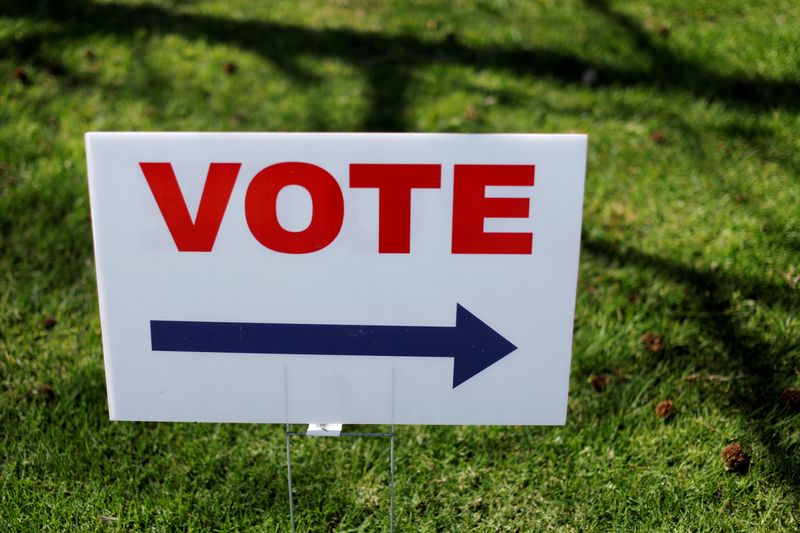By Ginger Gibson
WASHINGTON (Reuters) - Fourteen states and one U.S. territory are hosting Super Tuesday primary elections, a flurry that could bring more clarity about which Democratic presidential contender voters prefer to challenge Republican President Donald Trump in November.
More than a third of delegates will be doled out in Tuesday's nominating contests, compared with less than 5% awarded from the four states voting in February. A candidate needs at least 1,991 delegates to the party's national convention in July to win the Democratic nomination outright.
The votes will test U.S. Senator Bernie Sanders' front-runner status after wins in New Hampshire and Nevada and a near-tie in Iowa. Former Vice President Joe Biden will look to build on momentum from his big South Carolina victory and become the leading moderate alternative to Sanders, a self-described democratic socialist from Vermont.
On the eve of Super Tuesday, two of Biden's rivals who quit the race, Amy Klobuchar and Pete Buttigieg, threw their support behind him, which Biden hopes will fuel his momentum.
Former New York Mayor Michael Bloomberg will be on ballots for the first time, potentially further splintering votes in a field that has narrowed to five candidates.
Here is what you need to know about this key day in the Democratic presidential nominating battle.
WHAT IS SUPER TUESDAY?
After a month of states holding nominating contests one by one, Tuesday marks the first time a group of states hold primary elections on the same day. Historically, the batch of primaries has further winnowed the field.
California and Texas are the day's biggest prizes, with 415 and 228 delegates, respectively. California, the most populous U.S. state, held its primary in June during the 2016 presidential race but opted to return as a Super Tuesday state this time to try to increase its influence.
The other states with primaries on Tuesday are Alabama, Arkansas, Colorado, Maine, Massachusetts, Minnesota, North Carolina, Oklahoma, Tennessee, Utah, Vermont and Virginia.
Votes will also be conducted in American Samoa, a U.S. Pacific territory, and among a newly formed group of Americans living abroad.
WHAT IS AT STAKE?
On Super Tuesday, 1,357 delegates will be awarded, a significant chunk of the 3,979 pledged delegates at stake in the nominating race.
In order for candidates to win any delegates in a state, they must finish with at least 15% of the vote, either in the statewide total or an individual congressional district.
North Carolina, with its 110 delegates, could give the winning candidate bragging rights about success in a general election battleground state.
Sanders and U.S. Senator Elizabeth Warren will be tested in the states they represent: Vermont (16 delegates) and Massachusetts (91).
The other states' delegate counts are as follows: Virginia (99), Minnesota (75), Colorado (67), Tennessee (64), Alabama (52), Oklahoma (37), Arkansas (31), Utah (29) and Maine (24). Additionally, 13 delegates will be awarded for "Democrats Abroad" and six in American Samoa. (https://tmsnrt.rs/37bDD2f)
WHO IS BEST POSITIONED TO WIN?
To be competitive on Super Tuesday, candidates cannot simply invest time and money in one place to try to win votes. Instead, they must have the infrastructure and fundraising to air television ads and have staff in states across the country.
Sanders tops opinion polls in California, where he is hoping to capitalize on his early wins to build a large lead.
Biden watched his position there slide after failing to win any of the first three state votes, but his success in South Carolina and support from some of his former rivals could provide a late boost.
Bloomberg, a billionaire businessman, skipped the early states and has spent more than $500 million running ads in Super Tuesday states as he looks to surpass Biden as the front-runner among moderates.
Bloomberg appears to be taking moderate voters from Biden in Texas, where both men are hoping to best Sanders.
Massachusetts will also be closely watched, where Sanders is trying to deal a likely death blow to Warren's campaign by beating her in her home state.
WHEN WILL WE KNOW RESULTS?
With the exception of a single caucus in American Samoa, the rest of the Super Tuesday states are holding primaries, meaning they should be able to avoid the problems that led to reporting delays after caucuses in Iowa and Nevada.
But with so many states voting, the full picture of Super Tuesday results could still take days to emerge.
Several states in the Eastern time zone will be the first to close their polls on Tuesday at 7 p.m. EST (0000 GMT). Results should start to trickle in soon afterward, although it will likely take hours for all the votes to be tabulated and winners declared.
California's polls close last at 8 p.m. Pacific time (0400 GMT Wednesday). In 2016, because the race was so close, it took a month for California Democratic officials to count all of the votes and declare Hillary Clinton the winner over Sanders.

State officials are hoping that even with a tight race and bigger field this year, the Democratic nominating battle is settled more quickly. If the margins are close, California could take a while to reach a conclusion as it waits to count absentee ballots postmarked by Super Tuesday.